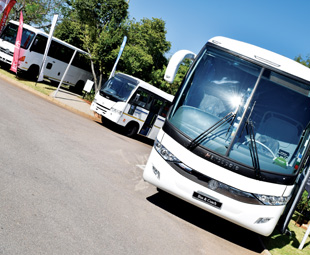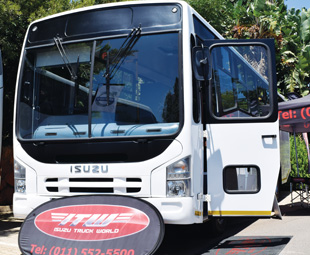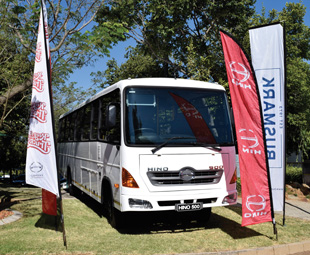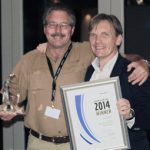The cycle needs to be broken

The word “crisis” sums up the overall mood among the delegates attending the Southern African Bus Operators Association (Saboa) conference and exhibition this year; with concerns for the industry’s future top of mind.
“I’m scared that in five or ten year’s time we’ll be discussing the same problems. The local bus industry is in crisis – we need to find solutions for the future,” said Jack van der Merwe, of the Gautrain Management Agency, and master of ceremonies at the conference.
While, in her keynote address, the Deputy Minister of Transport, Sindisiwe Chikunga, mentioned the great advancements made by government in the area of public transport in the recent past, the mood among delegates was one of uncertainty regarding the future.
In fairness, Chikunga did acknowledge the many challenges still faced by the public transport sector. While the need for better rural operations and improved driver health and safety featured, her address centred mainly on funding.
 “Unfortunately South Africa’s public transport challenges are compounded by serious service backlogs, as a result of years of neglect and underinvestment in the sector. The cumulative shortfall has not yet been adequately addressed, and to do so will take a significant amount of time,” she stated.
“Unfortunately South Africa’s public transport challenges are compounded by serious service backlogs, as a result of years of neglect and underinvestment in the sector. The cumulative shortfall has not yet been adequately addressed, and to do so will take a significant amount of time,” she stated.
“Very little has changed in rationalising public transport subsidies, since they are still mode based. To execute a progressive programme of improvement across South Africa and to address the backlogs and fund implementation of policy, the current funding allocations will need to be sustained and increased. The current systems, and the way in which funds are allocated, have been reformed to support a sustainable Integrated Public Transport Network (IPTN),” she continued.
The topic of financial constraints and the subsequent battle for survival – due to nearly two decades of interim contracts and industry stagnation – was raised among conference delegates and speakers alike, particularly those taking part in the CEO forum.
“The bus commuter sector is in a straitjacket that locks us into an unsustainable business model. Operators cannot react to market conditions, reduce operating costs, increase revenue or introduce additional routes. We also cannot pass the shortfall on to passengers,” noted Thys Heyns, executive director of the Putco Group.
Heyns pointed out that the interim contracts, initiated as far back as 1997, are still in place and have been extended more than 150 times. They are old and outdated – operational requirements, and the cost-basis of the contracts, have changed dramatically since 1997. Many are simply no longer financially sustainable.”
To illustrate his point, Heyns noted that since the introduction of the Division of Revenue Act (DORA) in 2009, the expenditure of a typical bus company has increased by 50 percent, while subsidies only increased by 13 percent. “This has resulted in problems with service quality and ability to deliver,” he said.
 In his overview of the South African bus industry, Professor Jackie Walters also noted that the Public Transport Operational Grant (PTOG) is due to be reduced by a total of 12,2 percent (R407 million) between the 2015/6 and 2017/8 financial years. “This is very problematic as no operator can plan its financial affairs effectively with a continuously changing financial environment, especially at such short notice,” he noted.
In his overview of the South African bus industry, Professor Jackie Walters also noted that the Public Transport Operational Grant (PTOG) is due to be reduced by a total of 12,2 percent (R407 million) between the 2015/6 and 2017/8 financial years. “This is very problematic as no operator can plan its financial affairs effectively with a continuously changing financial environment, especially at such short notice,” he noted.
“The Department of Transport wishes to increase public transport ridership by three percent per annum – but we’ve had an expansion moratorium in place since 2001. There is no sign that it will be lifted, or that Treasury will change its stance on addressing the current funding issue,” said Walters.
“Where do we fit in as current service providers?” asked Norah Fakude, MD of Buscor. “The longest contract we’ve had since 2007 was 12 months. You can’t even finance a small car over that period, let alone a bus, yet we are expected to provide service. I don’t think our input is taken seriously. If it were, we would be given the comfort of longer-term contracts.
“Where do we get money to even maintain what we have? There is demand for extended services, but the subsidies don’t cover that. They are based on the kilometres we have signed for. Government doesn’t understand what operators are going through,” she continued.
Allied to the issue of operating contracts was the “favouritism” that is felt to be given to IPTNs over conventional bus services.
“Yes, bus rapid transit (BRT) is a world-class service, but it comes at a very high price. It is about five to six times more expensive than conventional services,” noted Nick Cronje, chairman of Golden Arrow Bus Services.
Walters noted that the BRT “value for money” proposition also needs to be relooked, in line with South Africa’s low urban densities, the infrastructural and operational cost of these systems (both now and to maintain them in the future) and the potential opportunity costs of investing these funds elsewhere in the public transport system and gaining much higher passenger/kilometre benefits.
 Heyns continued: “There is a funding disparity in favour of IPTNs, at the expense of conventional bus services. Conventional services have been neglected to the point where the industry faces a serious crisis … the system that has to form the backbone of bus transport in years to come is being destroyed.”
Heyns continued: “There is a funding disparity in favour of IPTNs, at the expense of conventional bus services. Conventional services have been neglected to the point where the industry faces a serious crisis … the system that has to form the backbone of bus transport in years to come is being destroyed.”
Fakude agreed: “We appreciate IPTNs, but government can’t let us die and then say it wants to integrate – because there will be nothing left with which to integrate. We need to sit down, get the points of view of government and operators, and move forward from one basis.”
“We must get the balance right and build on what we have, or we will destroy the sector,” Heyns emphasised.
Cronje continued: “If the industry is not secure and sustainable, it also has a much wider effect on the South African economy as a whole, affecting chassis suppliers, body builders, component suppliers, and so on. Government needs to be our partner and not be destructive in the process.”
After detailing the over R1 billion investment GABS has made in its operation over the last ten years – to become more efficient in terms of reliability of service and cost effectiveness – Cronje warned that not all shareholders in South African bus operations can be “as brave”. “Investment in bus companies needs to be formulated and based on long-term contracts with the knowledge that it will be financially sustainable and that they are partners with government.
“In the near future this will all come to a decisive point, where government will have to decide if it wants to promote public transport or not,” he concluded.
Clearly, the ball is in government’s court.
Published by
Focus on Transport
focusmagsa




